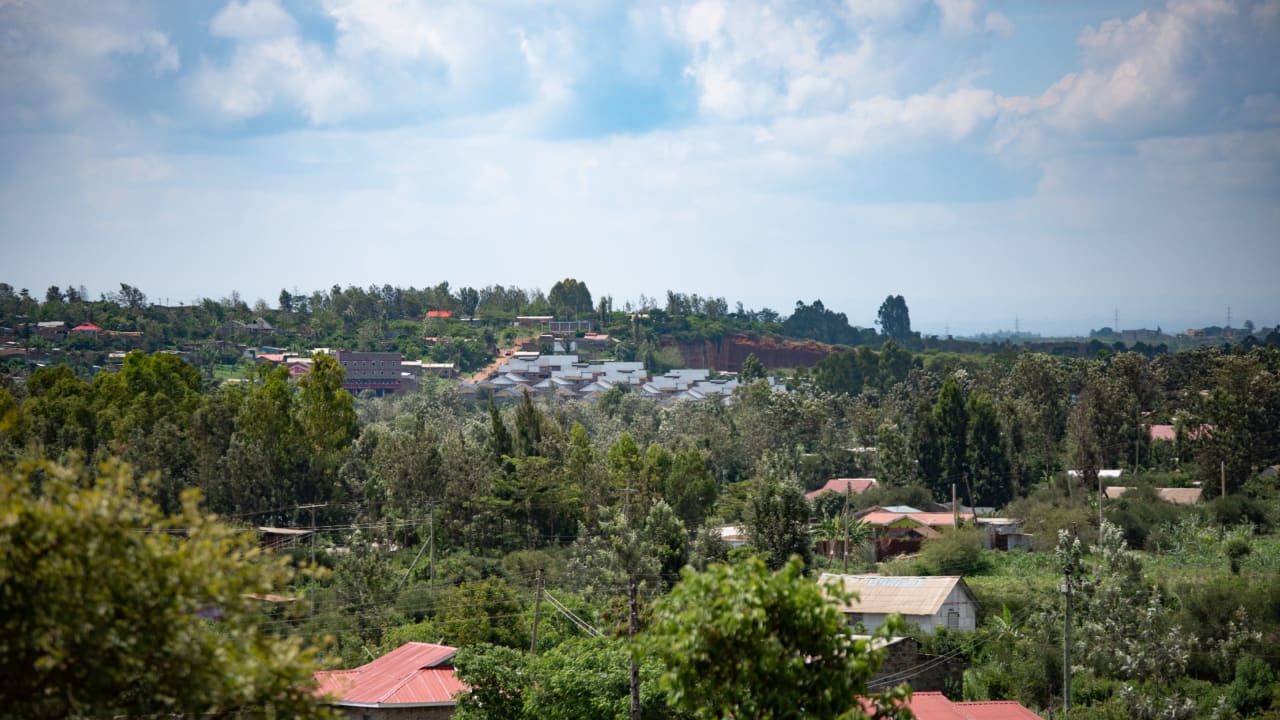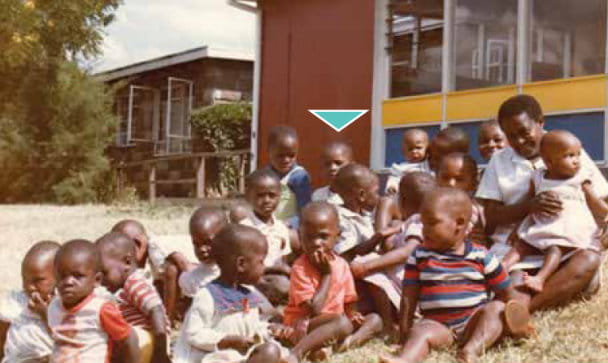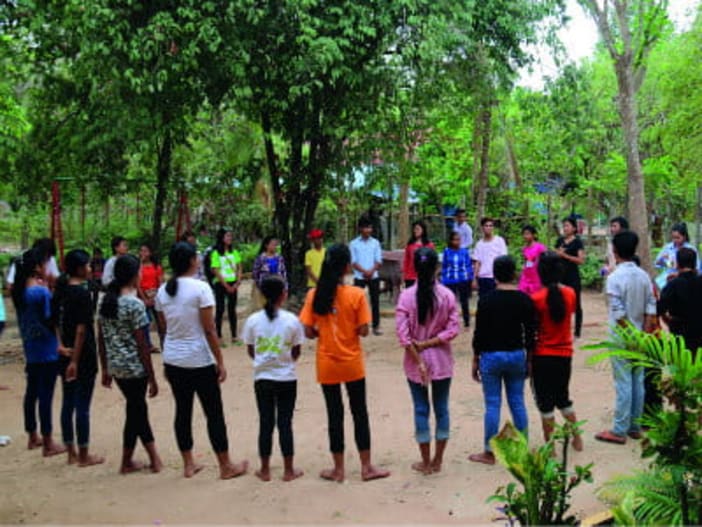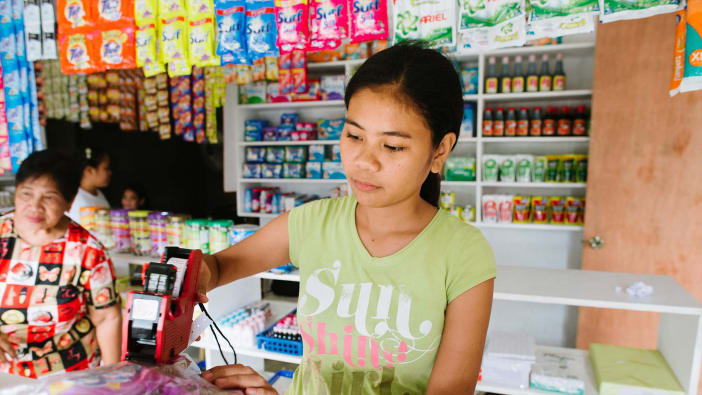Peter Kamau Muthui’s mother died when he was six weeks old, and his father died a year later. He and his five older siblings grew up in residential care in Kenya. Here, he shares the impact this had on his life, and how it led him to start the organisation Child in Family Focus – Kenya.
Interviews
Interview: My childhood in a children’s home
Peter Kamau Muthui and his five siblings grew up in residential care in Kenya. In this moving interview, he shares the impact this had on his life
2017 Available in French, English, Portuguese and Spanish

Landscape in Kenya. Photo: David Mutua

From: Caring for orphans – Footsteps 101
Stories of individuals, organisations and churches who are working to provide loving families for orphaned and vulnerable children

Peter Kamau Muthui is the founder of Child in Family Focus – Kenya.
What was it like for you growing up in a children’s home?
My upbringing in a children’s home had its share of highs and lows. I enjoyed occasional trips to see the world outside the home and particularly looked forward to going to school and church. I fondly remember my very first birthday celebration, aged seven. My nursery school teacher, Mercy, baked me a big cake and brought it to school. The next recognition of my birthday was when I turned 20.
I was one of 30 children under the care of two house mothers, who worked in shifts. This meant it was hard to get the attention, love, care and guidance I needed for a healthy and happy childhood. We never lacked material things. The biggest lack was love and attachment.
I got used to routines and noticed the harsh consequences of not keeping to them. Help with homework was a challenge. It was hard to get just three minutes of the house mother’s time for a difficult arithmetic question.
Seeing children, including my friends, getting fostered and adopted left me wondering when my turn would come. Every time visitors came to the home, I was on my best behaviour. I wanted to increase my chances of being loved and taken away to be part of a family.
At first, four of my siblings were in different institutions to me and my youngest sister. We were eventually moved to the same children’s home. I longed to see my elder siblings, but this was only possible at special events and sometimes at meals.

Peter (highlighted by arrow) with some of the others in the children’s home.
I still feel the effect of this limited interaction with my elder siblings. There is not a tight bond between us. My eldest brother’s suicide in 2007 was a big blow to the family. It shows that many young people leaving care do indeed end up depressed and suicidal.
Despite the challenges of my upbringing, I have the children’s home to thank for who I am today. I strongly believe that God allowed me to go through the experience for a reason. It prepared me to become an advocate for change.
Did you feel well prepared for the outside world when you left the children’s home?
No, I was ill-prepared for life outside the home. Like many who had gone before me, I was left to manage alone.
I had spent years following a structured routine where I had little or no choice, and so I struggled with independent life. Forming relationships, cooking and budgeting were challenging for me.
The lack of positive interaction with adults at the children’s home meant I lacked personal confidence and key social skills. This included the skills necessary for starting a family.
Despite this, I think I had a rather ‘soft landing’. Soon after completing my college studies, I was asked to work at the children’s home. At first I was a teacher’s assistant. I then became a social work assistant while I studied for my bachelor’s degree. I later served as Social Programmes Manager for nine years.
What insights did you gain from working as Social Programmes Manager in the home?
Firstly, I learnt that being orphaned was not the main reason children were admitted into care. The majority of the children in the home had one or both parents alive, as well as many able relatives. Poverty was the main reason for putting children into care. People wrongly thought residential care had more to offer children than relatives.
Secondly, I learnt that even high-quality institutional care cannot replace families! Families provide children with love and a sense of belonging. They teach social skills, and help children connect with the wider community. Children ‘age out’ of care, but there is no ageing out of families.
Most children leaving care struggled to be accepted back into the community. There was a high chance they would end up involved in criminal activities, sexual exploitation, drug abuse and early marriages.
I learnt that family-based care options had great benefits for children. We started an adoption agency and an outreach programme that supported children within their own families. This helped to strengthen families and prevent separation. These programmes continue to have a positive impact on the lives of children in Kenya.
What has helped you cope with, and heal from, the effects of growing up in residential care?
Salvation and God’s word – I continue to pursue an even deeper relationship with God. His word is full of great promises that I apply to my life daily. I have found salvation, healing, joy, purpose and hope in him.
My church family – I am part of the praise and worship ministry at church. I also belong to a fellowship group that meets weekly and includes a few people who were at the children’s home with me. This fellowship group has become my family.
Support groups – I am a part of the Kenya Society of Care Leavers, and still interact with my siblings and friends who I grew up with in care. This helps me cope with the effects of my upbringing.
It is important to choose to forgive and forget the past, and focus on the work God is doing in and through us.
Could you tell us about the work of Child in Family Focus – Kenya?
In 2011, I felt God was calling me to join him in pursuing a new vision. I set up Child in Family Focus – Kenya to champion family-based care for orphaned and vulnerable children in Kenya. We do this through advocacy, assisting with deinstitutionalisation (phasing out orphanages), and monitoring governance in child care and protection matters.
Our mission is to uphold every child’s right to family-based care. Our vision is a Kenya where family-based care for orphaned and vulnerable children is the norm rather than a privilege. In 2016 the organisation played a key role in the creation of the Alternative Care Alliance – Kenya. The alliance brings together individuals, NGOs and the government to work towards implementing the Guidelines for the Alternative Family Care of Children in Kenya.
What message would you like to give to Footsteps readers?
That God places the lonely in families. (Psalm 68:6). God’s plan for caring for children is the family. It is a much better plan than caring for them in children’s homes – no matter how beautiful and well run a children’s home may be.
For those who are supporting children’s homes, now is the time for a change of mindset. Challenge those managing orphanages to transform them into community support centres. These centres can strengthen families so they can care for their own children and orphaned relatives. If kinship care is unavailable or unsuitable, we should support other forms of alternative care, such as foster care and adoption.
Finally – God never wastes pain, but grows beauty and purpose from it.
Peter Kamau Muthui is a founding partner and director of Child in Family Focus – Kenya.
Website: www.childinfamilyfocus.or.ke
Email: [email protected]
Peter is part of Tearfund’s Inspired Individuals programme, which supports new leaders who are bringing transformation to their communities.
Website: www.tearfund.org/inspired
Contact details for the Kenya Society of Care Leavers:
Website: www.kesca.org
Email: [email protected]
Phone: +254 721 612864
View or download this resource
Get this resource
Get this resource
Similarly Tagged Content
Share this resource
If you found this resource useful, please share it with others so they can benefit too.

Subscribe to Footsteps magazine
A free digital and print magazine for community development workers. Covering a diverse range of topics, it is published three times a year.
Sign up now - Subscribe to Footsteps magazine





